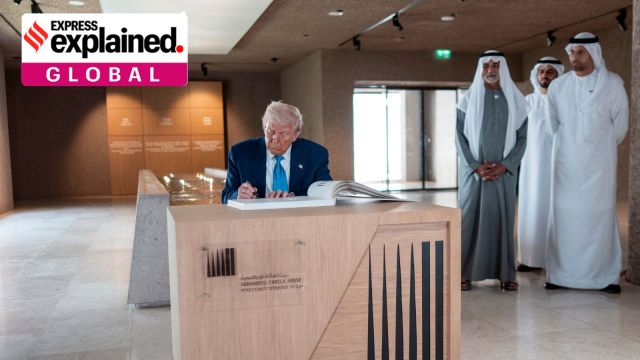The art of the deal: What Trump’s latest trip to the Middle East tells us
The White House claims that Trump secured $2 trillion in 'great deals'. However, this trip marked a new chapter for US outreach in the Middle East. Here is what to know.
 President Donald Trump signs the guest book during a tour of the Abrahamic Family House, an interfaith complex in Abu Dhabi, the United Arab Emirates, on Friday, May 16, 2025. (NYT)
President Donald Trump signs the guest book during a tour of the Abrahamic Family House, an interfaith complex in Abu Dhabi, the United Arab Emirates, on Friday, May 16, 2025. (NYT)US President Donald Trump concluded his four-day visit to the Middle East on Friday (May 17), after signing billion-dollar trade deals in Saudi Arabia, Qatar and the United Arab Emirates (UAE).
According to a Forbes report, he signed $2 trillion in investment agreements with the three nations for projects in artificial intelligence, defence and aviation, among other sectors.
What are Trump’s trade deals valued at?
The White House claims that over $2 trillion had been secured in “great deals”, including:
- a $600 billion investment commitment from Saudi Arabia, largely focused on defence and tech sectors.
- $243.5 billion in US-Qatar commercial and defence deals, towards a $1.2 trillion economic exchange agreement with Qatar.
- $200 billion in US-UAE commercial deals, accelerating the 10-year $1.2 trillion investment commitment made by the UAE in March.
The valuations of these deals have been questioned: A tally by The New York Times of the public announcements of the US-Saudi deals, made at the Saudi-US Investment Forum on Tuesday (March 13), revealed the valuation at about $300 billion.
What were some major areas of investment agreements?
- 01
AIRCRAFT
Trump’s acceptance of a Qatar gift, a $400 million luxury Boeing 747-8 jet, united representatives across party lines in protesting the move. The President dismissed all such criticism, saying he would be a “stupid person” to turn down a free gift.
In the UAE, national airline Etihad Airways on Thursday committed $14.5 billion in investments in 28 American-made Boeing 787 and 777X aircraft with engines made by GE Aerospace, according to the White House. And in Qatar, Boeing reportedly secured its largest ever deal for widebody aeroplanes on Wednesday, when national carrier Qatar Airways ordered 160 jetliners with the options to buy 50 more. This deal is valued at $96 billion, according to the White House, which also claimed that the deal will support 154,000 US jobs annually.
However, it may be years before the jets are actually delivered, with the company’s current backlog of 5,600 planes, amounting to more than seven years of production, according to a BBC report.
- 02
DEFENCE AND SECURITY
Saudi Arabia signed a $142 billion defence deal with the United States, making it the largest defence sales agreement in history, according to the White House. Under this agreement, the US will provide Saudi Arabia with state-of-the-art warfighting and air defence equipment from over a dozen American defence firms.
In Qatar, American firm Parsons successfully landed 30 projects worth up to $97 billion. Donald Trump further said that Doha will invest $10 billion in a US military facility and purchase $42 billion in weapons from the US.
- 03
AI DATA CENTRES
Saudi Arabian company DataVolt announced $20 billion investments in AI data centres and energy infrastructure in the US. Further, Google, DataVolt, Oracle, Salesforce, AMD, and Uber committed to $80 billion investment commitments for transformative technologies in both the US and Saudi Arabia.
The proposed US-UAE AI Data Centre in Abu Dhabi, will be the largest of its kind outside of the US, according to the Department of Commerce. The complex will have a data processing capacity of 5GW, enough to power a major city.
- 04
SCI-TECH
Qatari company Al Rabban Capital signed a $1 billion investment deal with Quantinuum for advancements in quantum technology and workforce generation in the sector. Qatar signed a $1 billion deal with the US to acquire counter-drone technology from American firm Raytheon RTX and a $2 billion deal with General Atomics to purchase remotely piloted aircraft.
- 05
ALUMINIUM
According to the White House, the UAE’s Emirates Global Aluminium would invest in a $4 billion primary aluminium smelter project in Oklahoma, while ExxonMobil Corp, Occidental Petroleum, and EOG Resources were partnering with the Abu Dhabi National Oil Company in expanded oil and natural gas production valued at $60 billion.
- 06
INFRASTRUCTURE
US companies such as Hill International, Jacobs, Parsons, and AECOM landed the contracts for Saudi projects, including King Salman International Airport, King Salman Park, The Vault, Qiddiya City, making investments worth over $2 billion.
Why is Trump’s Middle East visit significant?
A key element of this trip was the presence of prominent business leaders seeking to establish and expand their presence in the Middle East. Trump attended the Saudi Arabia-US Investment Forum dinner on Tuesday with Tesla founder Elon Musk, OpenAI’s Sam Altman, Palantir’s Alex Karp, BlackRock’s Larry Fink, and Blackstone’s Steve Schwarzman. The presence of top business leaders at the summit, flanking Trump, carried forward a trend made known at his inauguration in January.
Beyond the business deals, the trip marked a new chapter in American outreach to the region. On Tuesday (May 13), he said, “It’s crucial for the wider world to note this great transformation has not come from Western interventionists or flying people in beautiful planes, giving you lectures on how to live and how to govern your own affairs.” The statement was ‘historic’, according to Faisal Abbas, Chief Editor of the Saudi newspaper Arab News, and presents a “turning point” for American engagement in the region.
Trump significantly announced an easing of the long-standing US sanctions on Syria, meeting with Al-Qaeda leader-turned-Syrian President, Ahmed al-Sharaa. He also signalled a willingness to engage in dialogue with Iran over easing sanctions to enter into a nuclear deal.
Most remarkably, the trip came when the US President faced low approval ratings domestically, amid criticism of deportations and his yo-yoing stance on tariffs. The Middle East visit helped distance him from his family’s business dealings in the region, which he has long been criticised for. According to an NYT report, the trip highlighted deals with private firms unrelated to Trump’s personal business interests, and made no presentation of the contentious $400 million Boeing 747 gifted by Qatar.






- 01
- 02
- 03
- 04
- 05
































